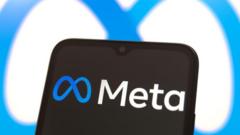In an announcement from Meta CEO Mark Zuckerberg, the company unveiled plans to overhaul its content moderation system, transitioning from independent fact-checkers to a community notes approach. This model, inspired by practices on X (formerly Twitter), allows users to comment on the accuracy of posts, thereby encouraging diverse viewpoints to engage in discussions. Kaplan, now leading Meta's global affairs, articulated that the previous reliance on moderators became overly restrictive, stifling free speech and censoring non-harmful content. The upcoming changes, to be rolled out in phases, aim to remove constraints on diverse topics such as immigration and gender identity that have historically provoked political debate.
Meta Platforms Shifts to User-Driven Content Moderation on Facebook and Instagram

Meta Platforms Shifts to User-Driven Content Moderation on Facebook and Instagram
Meta is set to move away from third-party fact-checking in the U.S., instead embracing a community-driven model for content evaluation that aligns with a stance on free expression.
The shift occurs against a backdrop of evolving political dynamics, particularly with the impending inauguration of President-elect Donald Trump, signaling a potential realignment of Meta's content policy priorities.
In a collaborative effort to reinvigorate debate and expression, Meta emphasizes the importance of open discourse on its platforms, believing that limitations on topics that are openly discussed in public forums should not exist online. This strategic decision reflects both a timely response to user frustrations and a desire to foster greater engagement amidst a politically charged environment.
The timeline for these changes aligns with burgeoning critiques of social media censorship, as Zuckerberg perceives the recent electoral landscape as a critical moment for prioritizing free speech.
In a collaborative effort to reinvigorate debate and expression, Meta emphasizes the importance of open discourse on its platforms, believing that limitations on topics that are openly discussed in public forums should not exist online. This strategic decision reflects both a timely response to user frustrations and a desire to foster greater engagement amidst a politically charged environment.
The timeline for these changes aligns with burgeoning critiques of social media censorship, as Zuckerberg perceives the recent electoral landscape as a critical moment for prioritizing free speech.




















